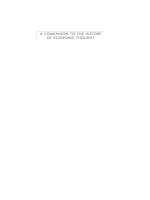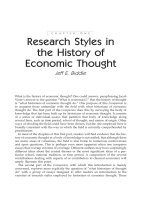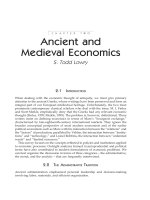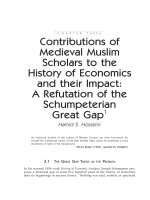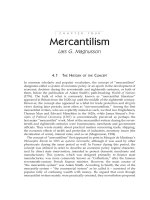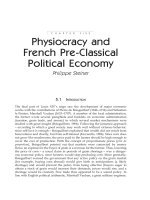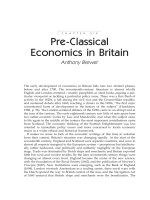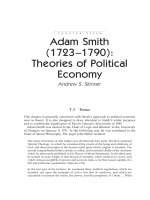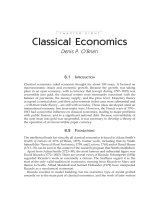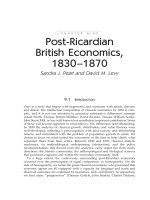A Companion to the History of Economic Thought - Chapter 1 pot
Bạn đang xem bản rút gọn của tài liệu. Xem và tải ngay bản đầy đủ của tài liệu tại đây (118.97 KB, 8 trang )
RESEARCH STYLES IN THE HISTORY OF ECONOMIC THOUGHT 1
CHAPTER ONE
Research Styles in
the History of
Economic Thought
Jeff E. Biddle
What is the history of economic thought? One could answer, paraphrasing Jacob
Viner’s answer to the question “What is economics?,” that the history of thought
is “what historians of economic thought do.” One purpose of this Companion is
to acquaint those unfamiliar with the field with what historians of economic
thought do. The first part of the Companion does this by surveying the body of
knowledge that has been built up by historians of economic thought. It consists
of a series of individual essays that partition that body of knowledge along
several lines, such as time period, school of thought, and nation of origin. Other
ways of dividing the field could have been chosen, but the one employed here is
broadly consistent with the way in which the field is currently comprehended by
practitioners.
In most of the chapters of this first part, readers will find evidence that the his-
tory of economic thought as a body of knowledge is not settled; that although there
are many areas of consensus, the field is also home to numerous controversies
and open questions. This is perhaps even more apparent when one compares
essays that overlap in terms of coverage. Different authors may have surprisingly
different ideas about the central themes or the most significant ideas of a par-
ticular school, national tradition, or time period. A comparison of the several
contributions dealing with aspects of or contributors to classical economics will
amply illustrate this point.
The second part of the Companion, with which this introduction is mainly
concerned, explores more explicitly the question of “what historians of thought
do” with a group of essays designed to offer readers an introduction to the
varieties of research styles employed by historians of economic thought. These
2 J. E. BIDDLE
essays make it clear that there is, in fact, a fair amount of methodological diver-
sity to be found in the field of the history of economic thought, a diversity that
is in no small part responsible for the unsettled nature of the field referred to
above. [Samuels (1983) and Medema and Samuels (2001) reveal in more detail
the variety of approaches employed by historians of economic thought, through
examinations of the work of notable practitioners.]
Those who have contributed to writing the history of economic thought over
the decades have been motivated by a variety of questions and purposes, and
have used a variety of research strategies and source materials. This variety
stems in part from the fact that historians of economic thought have had differ-
ent interests and thus different ideas about what types of historical phenomena
are most intriguing. But it also results from the fact that they have explicitly
or implicitly adopted different answers to fundamental historiographic questions,
questions about the purposes for which history is written and about the best
methods for accomplishing those purposes. A number of the chapters of part II,
in particular those of Matthias Klaes and Anthony Waterman, deal with the basic
historiographic issues that have generated and are revealed by the many research
styles found in the literature of the history of economic thought.
Research in the history of economics has for the most part been research in
intellectual history; that is, an attempt to understand the ideas of past thinkers
and how and why those ideas have developed and changed through time. In
particular, research in the history of economics has been concerned with discov-
ering what people in the past have believed about phenomena that either they
or the researcher regard as economic activity, and why they have believed it.
Notwithstanding the above-mentioned diversity of research approaches that can
be observed among the scholars engaged in this task of discovery, however, there
has traditionally been one task that has dominated the work in the field: that of
developing a more complete and more correct understanding of the theoret-
ical creations of those whom history has identified as great and/or influential
economists.
So, a central question that has motivated most research efforts in the history of
economic thought has been of the form “What was Adam Smith’s (or Karl Marx’s,
or John Maynard Keynes’s) theory of X?” And by far the most commonly adopted
approach to answering questions of this type has been to examine the published
works of the economist in question. This means that most research in the history
of economic thought has involved textual exegesis or interpretation; that in a
sense the work of most historians of economic thought has been similar to the
work of theologians seeking the true interpretations of scriptural writings, or
legal scholars and judges seeking the true intent of legislators. And while it may
be argued that the material with which the historians of economics work is of
less significance, the intellectual problems that they face in the task of interpreta-
tion are much the same. As is clear from a number of the contributions to the first
part of this Companion, many of the debates in the field arise from differences
over the correct interpretation of a particular text or texts and, by implication, the
exegetical or interpretive guidelines that one should follow in interpreting texts.
The essays of Ross Emmett and Vivienne Brown deal with some of the basic (and
RESEARCH STYLES IN THE HISTORY OF ECONOMIC THOUGHT 3
rather perplexing) issues that face the historian of economic thought in the pro-
cess of textual exegesis. Waterman’s essay also discusses the uses of and problems
associated with a form of interpretation that emerged as important in the second
half of the last century, that of translating theories presented in literary form into
mathematical models.
The search for clues and insights into what an economist really believed, or for
the correct interpretation of his or her theories, will sometimes take the historian
of economic thought beyond the published works of his or her subjects. Archival
material, such as letters or unpublished manuscripts and lectures, has been used
to clarify vague statements or sketchy concepts found in the published works of
economists, or to offer evidence that resolves apparent contradictions in those
works. Recent decades have seen a significant increase the use of archival mater-
ial by historians of economics, as well as greater efforts by the research community
to assemble and to make such material more accessible to scholars. With the
increasing use of archival material has come controversy over the weights to be
assigned in the interpretive task to evidence from unpublished versus published
writings. A related argument concerns the relative value of more broadly bio-
graphical evidence, material that may not explicate or even mention economic
theories and ideas, but sheds light on other aspects of the economist’s life, such
as upbringing, social interactions, hobbies, or political views. Does such material
also help to contribute to understanding the ideas of a past economist, or to
explaining the theoretical choices made by that economist? The various views on
this matter and the roles played by biography in understanding the history of
economic thought are explored in Don Moggridge’s essay.
Historians often seek a deeper understanding of an economist’s ideas by
searching for possible intellectual influences on the thought of the subject,
perhaps by reading books that the subject read or might have read, or familiariz-
ing him- or herself with the philosophical systems and political ideologies
that dominated intellectual discourse during the subject’s life. Such research may,
for example, reveal parallels between the subject’s conceptual framework or
theoretical assumptions and some contemporary philosophical system. The
argument that a particular interpretation of an ambiguous passage would rep-
resent a similar parallel can then be offered as evidence for that interpretation.
Or, if interpretive differences arise because a key assumption was left unstated
or unclear in the published work, an understanding of the preconceptions or
ideological beliefs that prevailed in the subject’s social or intellectual circles might
provide the foundation for reasonable conjectures about what the subject was
assuming.
Although explications and interpretations of the work of those that current
opinion regards as great economists dominate the literature of the history of
economic thought, the ideas of others have also received attention. One finds
studies of “neglected” economists, for example, those whose ideas the researcher
does not feel have achieved the attention they deserved. Sometimes the ideas of
people whom history has not identified as economists, but remembers for some
other reason – political figures, philosophers, scientists, novelists, and so on –
have been the object of research. Instead of the conventional question “What did
4 J. E. BIDDLE
Y really think about X?” a scholar may ask “What did the general public (or the
typical businessman, or influential policy-makers) think that Y was saying about
X?” Such information is of interest for its own sake, and because it may provide
an understanding of the impact of the economic thought of a particular author on
the public discourse and perhaps on public policy.
Of course, whether the object of research is the Wealth of Nations or a little
known work by an American legal scholar, the difficulties of determining the
author’s intended meaning, and the many alternative approaches to overcoming
these difficulties, remain. It is also worth noting that the concept of “the author’s
intended meaning” is not an unproblematic one – some historians of thought
have argued that the true meaning intended by a writer either does not exist or
cannot be definitively established; others that the author’s intended meaning,
even if it could be established, is of no greater significance than what the researcher
or anyone else thinks the author meant. Such assertions do not go uncontested, of
course, and the arguments to which they give rise make for thought-provoking
reading. Brown’s essay provides an introduction to this area of controversy.
It is not uncommon that an article in a journal devoted to the history of eco-
nomic thought will have as its sole purpose a careful and well documented
explication of some aspect of a past economist’s ideas, but often such exegetical
work is a means to a larger purpose. It may be a prelude to the identification
of the economist or one of his or her theories with some larger movement in
economics – a certain school of economic thought, for example, or a particular
approach to economic theorizing that has persisted through time. Historians of
economic thought also attempt to reveal the links between economic theories and
aspects of the world of ideas beyond economic thought, including philosophical
movements, theological traditions, political ideologies, and developments in the
natural sciences. Such links have been found to run both ways, as economists’
ideas and theories have both reflected and influenced the ideas of those writing
in other fields.
Historians of economic thought frequently give accounts of the theories of past
economists or the general approaches of schools of economic thought in order to
evaluate them. The goal may be to critique the work of past economists (and
perhaps, by implication, the work of later economists who have built upon it) or
to show the superiority of past theories or approaches to some modern alternat-
ive, be it heterodox or orthodox. Related to this type of work is that which seeks
to provide an historical pedigree for a novel theory of, or approach to explaining,
some phenomenon. In the process of recounting the ideas of the past the author
may attempt, as it were, to portray him- or herself, or some admired colleague, as
one who is working within an established and respected intellectual tradition.
The general value of history written for such purposes is a matter of disagree-
ment among historians of economic thought, but be that as it may, a great deal of
it has been written. John Lodewijks’s contribution discusses the general approach
and some of the literature that has resulted from applying it.
The history of economic thought is concerned not only with what people
believed in the past, but why they believed it; not just how beliefs changed
over time, but also why the changes occurred. These “why” questions are both
RESEARCH STYLES IN THE HISTORY OF ECONOMIC THOUGHT 5
fascinating and difficult, and proposed answers have been yet another source of
controversy in the field. For example, a researcher’s attempt to place economic
theories and ideas in the context of the philosophical, theological, or ideological
systems of their day may be, as mentioned above, an exegetical strategy, but it
may also be part of an effort to explain why an economist made particular theoret-
ical or methodological choices in attempting to explain economic phenomena,
and why the intended audiences either believed or did not believe the explana-
tions that the economist offered. The justification for this is that what people (i.e.,
both economists and their audiences) consider plausible is a function of their
economic or class interests, the ethical or philosophical systems they learned in
their youths, and so on. Marx’s notion of the intellectual superstructure of a
society being derivative of its economic base and system of class relations is one
influential version of this argument; another version of this argument underlies
Mark Perlman’s essay and its attention to the role of a few key authority-systems
in shaping the development of economic thought. A third rationale for studying
the times in which an economist lived is associated most notably with Wesley
Mitchell, who argued that the economic theories proposed and accepted at a
particular time are best understood as responses to what are seen at the time as
the most pressing political and economic problems (Mitchell, 1967, ch. 1). Such
arguments about what causes people to propose or believe a particular explana-
tion of economic activity at a moment in time can also be applied to explaining
changes over time in economic theories, in the fortunes of particular schools of or
approaches to economic thought, and so on; that is, they are held to be due to
changes over time in philosophical fashion, ideology, religious beliefs, or events
in political and economic history.
These sorts of arguments do not go unchallenged. An alternative view is that
economists’ choices of theoretical problems to solve and methods of solving them
have, at least for the past 200 years, been driven mainly by a desire to improve or
expand the theoretical corpus created by their predecessors and contemporaries
with respect to such things as descriptive accuracy, logical coherence, or range
of applicability. As it has sometimes been expressed, theoretical choices of eco-
nomists are best explained by factors internal to the activity of economic thought.
Similarly, the main factors that govern whether a theory comes to be widely
believed (at least within the community of economists and among the more
thoughtful members of their audiences) are things such as the logical coherence
and generality of a theory, and the extent to which, in one sense or another, it fits
the facts (which are held to be perceived in an objective fashion). Theories that
perform better in these respects eventually drive out inferior theories. Factors
“external” to the realm of economic thought – such as current events, political
ideologies, or class interests – play only a minor role in determining changes over
time in orthodox economic thought. A careful analysis of the debate concerning
the relative importance of internal versus external factors in governing what
economic theories people believe can be found in Klaes’s essay, but it is clear that
a historian’s own opinion as to which factors are more important will influence
the historical questions that he or she chooses to explore, and the sources and
methods that he or she uses in exploring them.
6 J. E. BIDDLE
During the 1960s and 1970s, historians of economic thought become more
aware of the work of historians and philosophers of science in trying to explain
why scientific theories changed over time and how the scientific community
chose between competing theories of the same phenomena, along with the associ-
ated normative questions of how scientists should seek to improve their theories
and what criteria should be used to choose between competing theories. This
work teemed with ideas, arguments, and conceptual frameworks that could argu-
ably be applied in attempts to explain and evaluate the historical development
of economic theory, and such attempts were made in a number of influential
studies. References to Thomas Kuhn, Karl Popper, and Imre Lakatos, and atten-
tion to developments in the literature of the history and philosophy of science,
have since become standard features of the literature on the history of economic
thought. A number of the part II essays, in particular that of John Davis, discuss
details of this phenomenon.
As noted earlier in this introduction, the majority of published research in the
history of economic thought is devoted to explicating the theories and ideas of
famous economists, mainly through careful readings of their published works.
Furthermore, discussions of the impact or influence of the theories and ideas
of famous economists have largely been limited to their impact on other famous
economists. It has been suggested from time to time, and with more or less
forcefulness, that such activity might have reached the point of diminishing re-
turns, or at the very least that the understanding of the history of economics
provided by this traditional research approach could be enriched considerably
through the application of alternative research strategies. These sorts of sug-
gestion have not gone unheeded, and several of the part II essays describe
and survey the results of alternative approaches. Whereas the modal research
approach in the history of economics has implicitly begun with the concept of
economic theories being produced by individual economists armed only with
books and intellect, these alternative approaches begin with other pictures of the
process through which knowledge is produced, and/or attempt to follow more
carefully the processes through which this knowledge is transferred within and
beyond the community of economists.
Just as the basic concepts of and ongoing developments in the history and
philosophy of science have become part of the working knowledge of many
historians of economic thought, so too have many of the fundamental ideas and
methods employed by sociologists of scientific knowledge. Those attracted to the
research approaches of the sociology of knowledge have argued that it is fruitful
to conceptualize economic knowledge as something that is produced in a group
setting, through cooperative activity structured by social institutions. So, for
example, in trying to understand the choices made by economists at a certain
moment in time about what questions to pursue and how best to pursue them,
and the choices made by members of their audiences about what to believe, the
historian might study the reward structures inherent in the academic setting in
which the economists worked, the editorial processes through which books and
journal articles containing research findings were published, or the structure and
functioning of professional societies in which the economists interacted. Some,
RESEARCH STYLES IN THE HISTORY OF ECONOMIC THOUGHT 7
following the work of Robert Merton in the sociology of science, have argued
that economic thought since the start of the twentieth century has been embodied
or reflected in the output of large numbers of workers whose research is stand-
ardized in many ways by a shared institutional framework. As such, it becomes
possible and worthwhile to portray certain aspects of economic thought with
statistical measures, and to test hypotheses about changes in economic thought
with statistical methods. A. W. Bob Coats’s contribution to this Companion pro-
vides more detail on how concepts from sociology have been applied to the
study of the history of economics. A sociological view of the activities of the eco-
nomic profession and the processes that govern the transmission and acceptance
of ideas has also motivated much of the work on the transmission of ideas across
international boundaries, work that is surveyed by José Luís Cardoso.
Economists write to influence other economists, and historians of thought have
rightly given a great deal of attention to the success, or lack of success, that they
have experienced in that effort, looking into matters such as how Adam Smith
was influenced by William Petty, or how the models and methods of Alfred
Marshall reflected the influence of Augustin Cournot. But the economists them-
selves from before the time of Adam Smith have been very much concerned with
another audience as well: those who make economic policy. In light of that, it
seems obvious that the study of the history of economic thought should include
attention to the ideas of all those who, directly or indirectly, play a role in mak-
ing economic policy, and research on the processes through which their actions
and decisions have been influenced by, and perhaps have influenced, eco-
nomists. Craufurd Goodwin’s essay shows that this has indeed become a rich
research vein for historians of economics. Scholars have gone into the archives
of governmental agencies and the personal papers of governmental officials,
from which they have emerged with stories of economists acting directly as
policy-makers or as advisors to policy-makers, participating with more or less
effectiveness in an environment governed by very different rules than those that
prevail in the world of scientific discourse. Historians have followed the ideas of
economists as they passed into and through the hands of – and were often trans-
formed by – popularizers, intellectuals-at-large, literary figures, and others who
influence the course of policy, from presidents and cabinet members to the people
in the street who make up the electorate.
The first paragraphs of this introduction made reference to the diversity of
research styles in the history of thought. Klaes offers some evidence that this
diversity is increasing. I am not at this point going to join the argument over
which of these research methods are more fruitful or productive. I am, however,
willing to argue that within the history of economic thought the increase in
methodological pluralism has been a good thing. In particular, the impression
that a wider array of research topics and methods are coming to be accepted
within the field has attracted people with a wider array of intellectual interests
and aptitudes to the study of the general questions with which the field has
traditionally been concerned. At the same time, the literature of the field is becom-
ing more interesting, as previously unappreciated or under-researched aspects
of those questions are being explored in new ways.
8 J. E. BIDDLE
Bibliography
Medema, S. G. and Samuels, W. G. (eds.) 2001: Historians of Economics and Economic Thought:
The Construction of Disciplinary Memory. London and New York: Routledge.
Mitchell, W. C. 1967: Types of Economic Theory from Mercantilism to Institutionalism, ed.
J. Dorfman, 2 vols. New York: Augustus M. Kelley.
Samuels, W. J. (ed.) 1983: The Craft of the Historian of Economic Thought. Vol. 1 of Research in
the History of Economic Thought and Methodology. Greenwich, CN: JAI Press.
